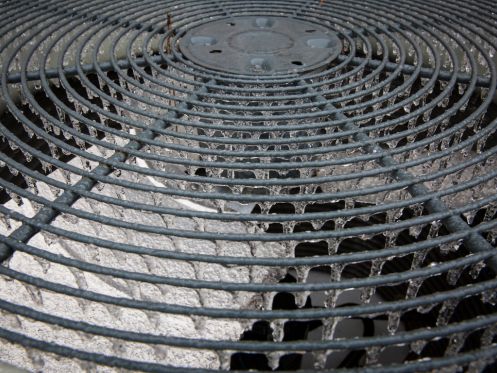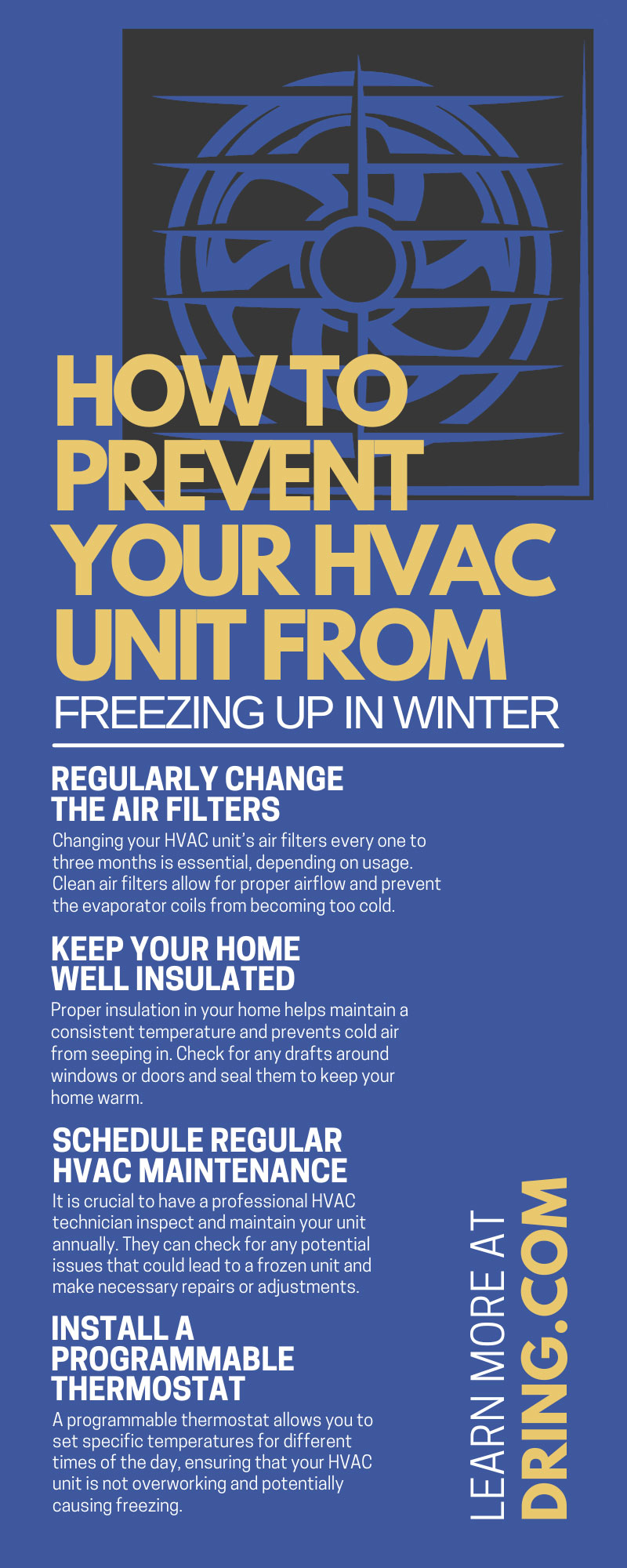As the temperatures drop and winter sets in, ensuring that your Heating, Ventilation, and Air Conditioning (HVAC) unit is functioning is essential. A frozen HVAC unit is a common issue homeowners face during the colder months. This issue results in discomfort and potentially costly repairs. This guide will teach you how to prevent your HVAC unit from freezing up in winter.
Understanding the Causes of a Frozen HVAC Unit
Before we dive into preventative measures, it is crucial to understand why your HVAC unit may freeze up during winter. This event can happen for several reasons.
Low Exterior Temperatures
The moisture in your heating and cooling unit’s coils can freeze when the temperature outside drops below freezing, causing the entire unit to freeze up.
Poor Insulation
Cold air can seep in and cause the temperature inside your home to drop, leading to frozen coils, if your home does not have adequate insulation.
Dirty Air Filters
Clogged or dirty air filters restrict airflow, causing the evaporator coils to become too cold and potentially freeze.
Low Refrigerant Levels
The refrigerant in your heating and cooling unit helps absorb heat from the air, but if there is not enough of heat, the evaporator coils can become too cold and freeze up.
Tips for Preventing Your HVAC Unit From Freezing Up
Now that we understand what causes a frozen heating and cooling unit. We’ll share some tips to prevent it from happening.
Regularly Change the Air Filters
Changing your HVAC unit’s air filters every one to three months is essential, depending on usage. Clean air filters allow for proper airflow and prevent the evaporator coils from becoming too cold.
Keep Your Home Well Insulated
Proper insulation in your home helps maintain a consistent temperature and prevents cold air from seeping in. Check for any drafts around windows or doors and seal them to keep your home warm.
Schedule Regular HVAC Maintenance
It is crucial to have a professional HVAC technician inspect and maintain your unit annually. They can check for any potential issues that could lead to a frozen unit and make necessary repairs or adjustments.
Install a Programmable Thermostat
A programmable thermostat allows you to set specific temperatures for different times of the day, ensuring that your HVAC unit is not overworking and potentially causing freezing.
Keep the Exterior Unit Clear
Ensure there are no obstacles or debris around the exterior unit, which can restrict airflow and cause the coils to freeze.
Use a Winter-Proof Cover
Consider using a winter-proof cover to protect your HVAC unit from the elements and prevent freezing if it is outdoors.
Keep Vents Open and Unobstructed
Ensure that all vents throughout your home are open and that furniture or other objects are not blocking them. Proper airflow is essential for preventing frozen coils.
What To Do if Your HVAC Unit Freezes Up
Despite our best efforts, sometimes an HVAC unit may still freeze up. Here are some steps you can take if this happens:
- Turn off the unit: The first step is to turn off your HVAC unit at the thermostat and circuit breaker.
- Check for obstructions: Inspect the exterior unit for debris or obstructions blocking airflow. Clear away any obstacles.
- Thaw the coils: Depending on the severity of the freeze, you may need to thaw the coils manually using a hairdryer or by leaving your unit turned off for several hours until the ice melts.
- Change air filters: Once the unit has thawed, change the air filters as they may be dirty and contribute to the issue.
- Check refrigerant levels: Continuous freezing may be due to low refrigerant levels. You will need to contact a professional HVAC technician to recharge the system in this case.
Other Common HVAC Winter Issues
While a frozen HVAC unit is a common issue homeowners encounter during winter, it is not the only one. Various other problems can arise, affecting the performance and efficiency of your HVAC system. Here are a few common HVAC winter issues.
- Faulty ignition or pilot light: Many HVAC units function correctly on the ignition or pilot light. However, your HVAC system may not produce heat, leaving you in the cold, if these elements fail or break.
- Leaky ductwork: Ductwork can develop leaks over time, resulting in significant heat loss. This issue compromises your home’s comfort levels and leads to increased energy consumption and costs.
- Thermostat malfunction: Your thermostat is the control center for your HVAC unit. It could lead to inconsistent or no heating if it malfunctions or fails.
- Mechanical wear and tear: Like any other machine, HVAC units are also prone to wear and tear, particularly during the colder months when they work harder to keep your home warm. This wear and tear can decrease efficiency, cause breakdowns, and require costly repairs.
- Carbon monoxide leaks: Being mindful of potential carbon monoxide leaks is crucial if you have a gas furnace. Carbon monoxide is a deadly, odorless gas that can leak from your furnace if you don’t adequately maintain it or if the furnace is old and worn out.
It is important to invest in regular professional maintenance, ensure your home has adequate insulation, and replace outdated components when necessary. You can ensure your HVAC system performs optimally throughout the winter and provides a comfortable and safe living environment by being proactive.
Importance of Professional Maintenance
Professional maintenance plays a crucial role in ensuring the longevity and efficiency of your HVAC system, particularly during the harsh winter months. An experienced HVAC technician has the expertise and tools to detect and address minor issues before they escalate into expensive repairs or replacements. Moreover, they can thoroughly clean and service the unit, improving efficiency and reducing energy costs. Besides, a professional can ensure that the refrigerant levels are optimal, minimizing the risk of the unit freezing up. Regular professional maintenance also extends the life of your HVAC unit, making it a wise investment for long-term savings and comfort. Don’t wait until your HVAC unit freezes up. Schedule regular professional maintenance to keep your unit running smoothly throughout the winter season. Contact Dring Air Conditioning and Heating for all your heating and cooling needs. Our air quality duct cleaning will help ensure your home stays clean and comfortable all winter long.
Learning how to prevent your HVAC unit from freezing up in winter includes consistent maintenance and attention. You can avoid the discomfort and potentially costly repairs of a frozen HVAC unit by following these preventative measures and regularly inspecting and maintaining your unit. Remember to take immediate action if your unit does freeze up, as a faulty unit can lead to more significant issues if you leave them unaddressed. Stay warm and comfortable this winter with a well-functioning HVAC unit!








